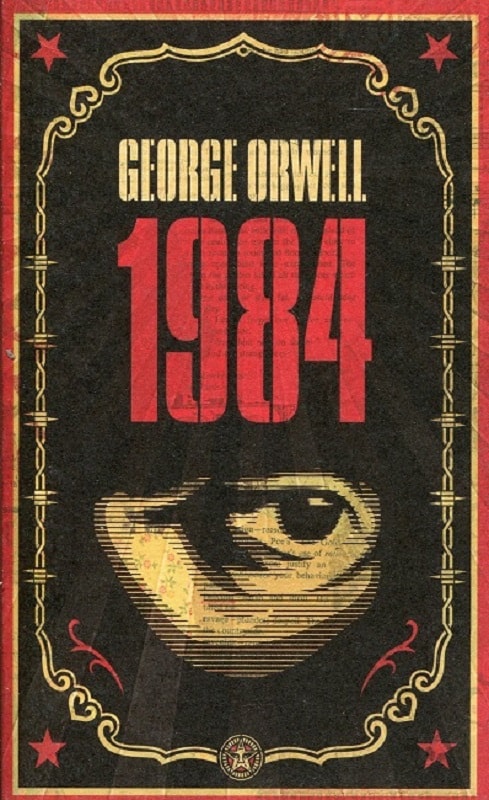PLOT: 5/5 RELEVANCE: 5/5 CHARACTERS: 5/5 ENTERTAINMENT: 5/5 OVERALL: 5/5
After a long time, I got my hands on something that wasn’t about the affairs of the world or decoding Tharoor’s onerous and demanding vocabulary while finding my way out to the conclusion of the book.
But little did I know that those 300 pages made more sense than any philosopher or great thinker ever did with his narratives about the world and its astounding power politics. And to make it as dramatic as fictions are, it sure wasn’t ‘your average fiction’.
George Orwell’s 1984 has been a timeless classic, yet there is something contemporary about it. Fascinated by its constant appeal for so many generations, I decided to take part in the conspiracy myself. Completing 100 pages a day of an ebook didn’t feel like an achievement till I did not reach the appendix of the work.
The impact of the book was so that the thought of it didn’t leave my head for hours and hours throughout the day. It felt as if it was written in this time and age and was so close to the living reality that it felt worth not escaping.
The paradox in Winston Smith’s life was one thing that would leave you gazing at the screen for days straight. While his sheer capability of comprehending the concept of real freedom was noteworthy, it was remarkable to witness the dilemma his mind was going through while trying to differentiate between reality and illusion that was constantly present because of the intense stare by Big Brother’s eyes and the invisible curve under his moustache which was inevitable to ignore.
The features were so definite that the presence of Big Brother felt almost real. His impressions were literally present in every form and everywhere, be it physically (or mentally).
Every object, living or dead, witnessed Big Brother everywhere, in the form of the posters and advertisements and telescreen and songs and Hate Hours organized by the party and the development of kids into Spies in their blue uniforms and so on. It was a never-ending trail of praises for Big Brother and his ideology of state control.
It’s left unsaid if Big Brother existed in reality or not, but every single movement and every single breath of the people were guided by his words “Big Brother Is Watching You”.
Winston Smith’s efforts to face his dilemmas and accept the reality around him made him understand his disliking for the state and its despotic ministries.
DESPITE TRYING HARD ENOUGH TO STAND AGAINST THE REGIME, BUT WITH ALL CAUTION TO AVOID THE ARREST UNDER ‘THOUGHTCRIME’, WINSTON FAILS TO MOVE THINGS ACCORDING TO HIS PLANS.
The book takes you through a rollercoaster ride of sentiments, that a human brain can perceive and reflect, without breaking the flow of the story. From a supposedly brave love story which you root for, to the failure of Winston’s decision-making instincts, you feel vexed, dismay, betrayal, heartbroken, all at once.
In 1984, the narration is so overwhelming that you are left to absorb all those nail-biting endings that you were not prepared for. And all of this coming out of just a three hundred-page fiction leaves you amused.
It’s difficult to let go of the fact that a mere fiction, written in the 1940s has enough strength to make you realize that the existence of power play and human exploitation in the non-fictional world is in no way different from what Smith lives every day.
It is not just an anxious story about the state and the use of its unfair means to do as it pleases, but also about human relations with one another. A story where parents can’t trust their own children, a colleague can’t sit with another colleague, an individual unable to even think the thoughts of his liking, a story about extensive inequality, and a story of an utter betrayal by your own instincts that get you in the hands of your enemy, served as a fresh fish.
It’s a bird’s eye view of the world that lives amidst conformity and surveillance of the people, by people.
The conclusion makes you realize that Orwell was a child of his time who knew more than any other nearing generation of fully evolved human intellectuals. Or maybe he just wanted to be honest to the growing generation who was about to read his excellent work that portrayed a clear picture of human psychology and the greed for power behind the smokescreen of 1984.
It’s an uncompromising reminder for us to have a look at the present and ever-evolving global stage to understand what Smith meant when he said, “Freedom is the freedom to say two plus two is four. If that is granted, all else follows.”
It makes you wonder if the definitions fed to us about the ideals of constitutions from all around the world stand true on the face of it, or it was just another big work of few philosophers. This review is just a medium of appeal to anyone who hasn’t picked up 1984 yet, but it is on their wishlist, to give it a shot without thinking twice.
Can’t wait to read it? Buy your copy of 1984 using the link below.
Review by Jayashree Mishra.
Jayashree is 20 years old, and a student of Delhi University Political Science (Hons). She has been reading since grade 6th and like any typical teenager, her first ‘favorite’ author was Chetan Bhagat, and his book 3 Mistakes Of My Life was her first read. She considers admiring Bhagat as the first mistake in her life. She is currently more inclined towards the world of nonfiction and but Khalid Hosseini still remains her favorite.
